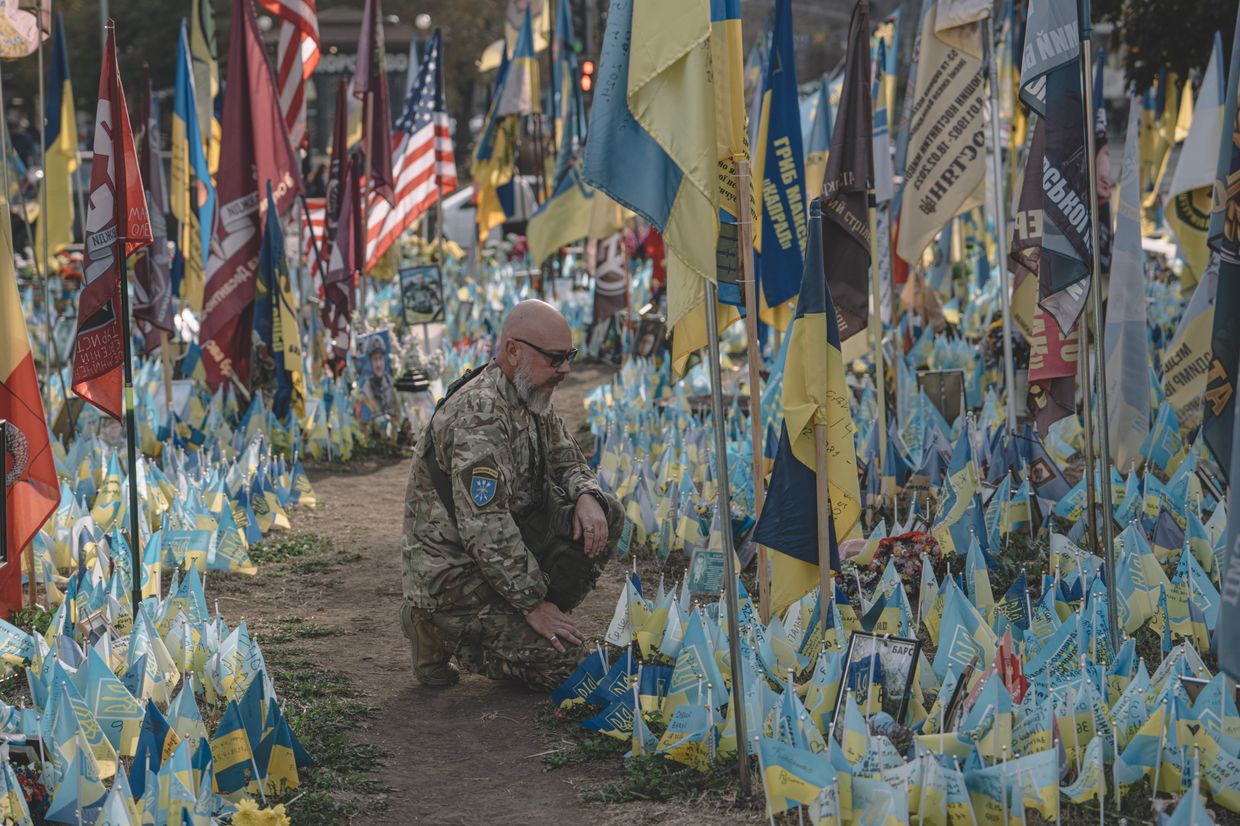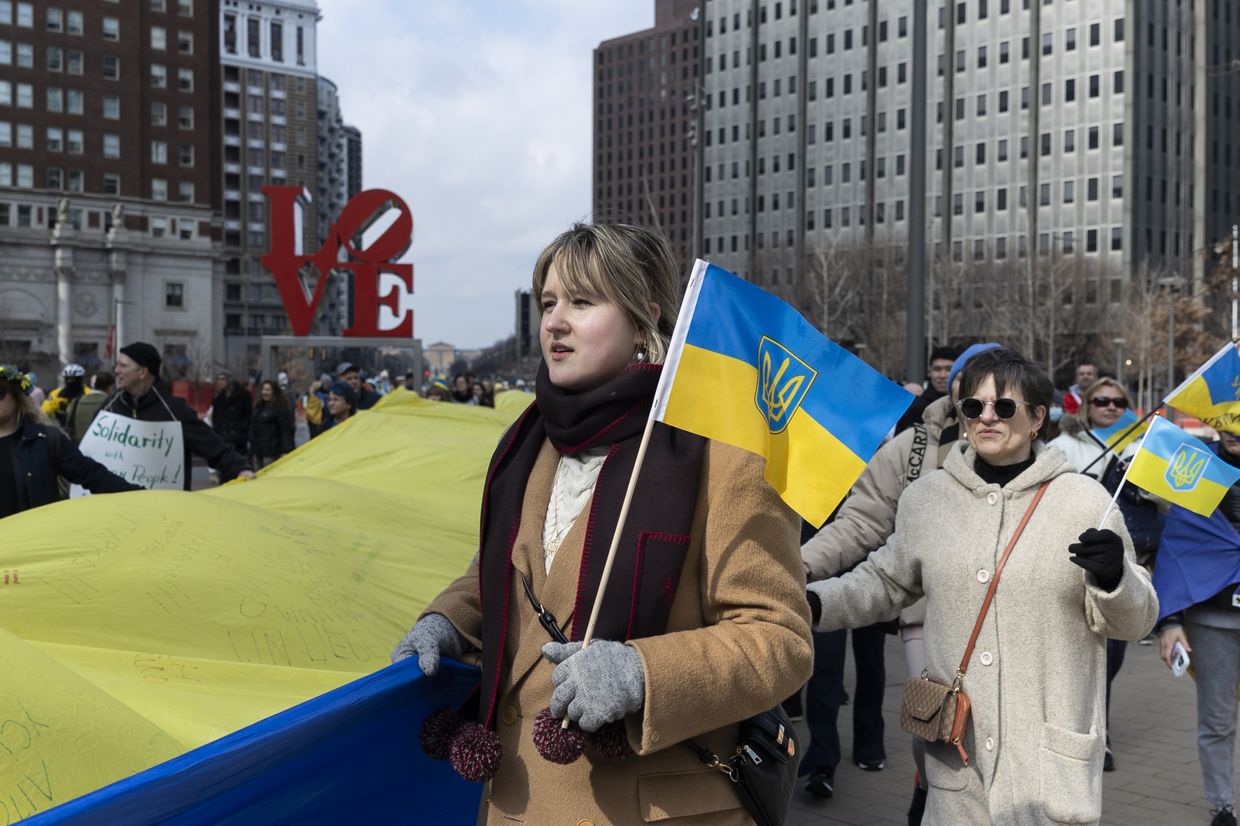Opinion: Handshaking Putin and hugging Lukashenko, UN head Guterres undermines the ICC
Guterres’ handshake with Putin and embrace of Lukashenko signal a troubling disregard for international justice and the authority of the ICC.

Russian President Vladimir Putin (R) greets UN Secretary General Antonio Guterres during their bilateral meeting on the sidelines of the BRICS summit in Kazan, Russia, on Oct.24, 2024. (Alexander Nemenov / POOL / AFP via Getty Images)
While the president of the International Criminal Court (ICC) recently expressed “high appreciation” for the United Nations’ cooperative relations during the commemoration of UN Day, a troubling incident unfolded 3,000 kilometers away from The Hague in Kazan, Russia. UN Secretary-General António Guterres, smiling and bowing his head, shook hands with Russian President Vladimir Putin, the very person the ICC seeks to arrest.
This meeting raises significant moral concerns, epitomizing a blatant disregard for the Ukrainian children who have been forcibly deported amid Russia’s war against Ukraine — charges for which Putin is wanted by the ICC. Beyond the emotional implications, this encounter undermines the principles that the UN itself should uphold.
As I argued on EJIL: Talk!, the European Journal of International Law’s blog, in 2013, the UN adopted guidance to regulate meetings between UN Secretariat staff and individuals subject to arrest warrants issued by the ICC. According to these guidelines, there should generally be no meetings between UN officials and persons subject to ICC arrest warrants. In a joint statement, Truth Hounds and several other Ukrainian NGOs extensively analyzed this legal framework and demonstrated a lack of justification for such a meeting.
Moreover, UN principles unequivocally establish that there should be no “ceremonial meetings” with or “standard courtesy calls” to individuals subject to ICC arrest warrants. The same holds true for receptions, photo opportunities, and attendance at national day celebrations. The photo from Guterres and Putin’s meeting speaks for itself.
A 2004 agreement between the UN and the ICC also requires the UN to refrain from any actions that could impede the ICC’s and the prosecutor’s activities or undermine the authority of their decisions.
How can we expect, in the words of the ICC’s president, to work toward “strengthening the rule of law at the international level and bringing accountability and justice for all,” if representatives of international organizations disregard these written rules?
Guterres’ personal meeting with Putin does not strengthen the rule of law or bring accountability and justice. Instead, it undermines public perception of the ICC’s authority and suggests a normalization of contacts with potential war criminals at the international level.
As professor of international law Sergey Vasiliev noted, “What grand humanitarian strategy may have guided the UNSG to shake the hand of Putin and bro-hug (Belarusian dictator Alexander) Lukashenka?”
On Oct. 24, the ICC found that Mongolia failed to cooperate in the arrest and surrender of Putin when he visited the country’s capital in September. Guterres’ reckless actions clearly do not foster a more serious attitude among states regarding ICC arrest warrants. Will ICC authorities comment on Guterres’ actions? Time will tell.
"What grand humanitarian strategy may have guided the UNSG to shake the hand of Putin and bro-hug (Belarusian dictator Alexander) Lukashenka?"
The disregard or negligent attitude of UN officials toward the principles of the UN and international law appears not to be an isolated incident. In May 2023, the UN Secretary-General’s Special Representative for Children and Armed Conflict, Virginia Gamba, traveled to Moscow to meet another ICC suspect for war crimes against children — Russian Commissioner for Children’s Rights Maria Lvova-Belova. Gamba issued only a general statement, claiming that “any guidance provided by the UN has been properly followed in the case of this visit.”

As Ryan Goodman, a founding co-editor of the international law blog Just Security, noted, the meeting faced extensive criticism from human rights groups (including Human Rights Watch and Amnesty International) and scholars of international criminal law and humanitarian law.
Despite this backlash, the ICC’s annual report on its activities for 2022-2023, submitted to the UN General Assembly (UNGA), did not even mention the Gamba-Lvova-Belova meeting. The 2023 annual report from the Secretary-General on the UN-ICC relationship did not address the meeting or justify its necessity. The only relevant information noted was that the UN continued to refrain from actions that might undermine the Court's activities or the authority of its decisions.
The problematic aspect is not limited to the meetings themselves, which the guidance allows in extreme circumstances; it extends to the apparent lack of accountability in justifying these visits. To the public, it seems the UN treats such meetings casually and carelessly. Instead of fostering open discussion and providing proper justification, UN representatives hide behind general remarks about compliance.
Without a proper response, those involved will feel free to engage in further meetings with ICC suspects without adequate explanation. It is high time for all stakeholders to swiftly react to the Guterres-Putin incident.
First, it is essential to establish whether the UN Office of Legal Affairs, as per the 2016 Best Practices Manual for United Nations-International Criminal Court Cooperation, informed the ICC’s prosecutor and the president of the Assembly of States Parties about the Guterres-Putin meeting in advance. This letter should substantiate why the meeting was deemed necessary and should be made public to allow society to understand the rationale behind it.
Second, Guterres, as Secretary-General, must explain the reasoning for his meeting with Putin, and a detailed public statement should follow, along with a confidential briefing to the Office of the Prosecutor General.
Third, in such instances, the president of the ICC’s Assembly of States Parties should engage with Guterres to seek explanations. The Assembly should also invoke UN-ICC Article 15(2) to request an explanation from Guterres regarding any breach of cooperation in line with the UN Charter and the Rome Statute.
The UN Secretary General declined Ukraine's invitation to the first Global Peace Summit in Switzerland. He did, however, accept the invitation to Kazan from war criminal Putin. This is a wrong choice that does not advance the cause of peace. It only damages the UN's reputation.
— MFA of Ukraine 🇺🇦 (@MFA_Ukraine) October 21, 2024
Finally, the ICC and the Office of the Prosecutor should react to the meeting, as it undermines the credibility of the ICC’s decisions. According to Article 18 of the UN-ICC Relationship Agreement, the Office of the Prosecutor should request any information obtained during Guterres’ meeting with Putin that may be useful for the investigation.
By taking these steps, alongside a strong reaction from human rights organizations and international law scholars, a more thorough consideration of any contact between UN officials and individuals wanted by the ICC can be achieved. These measures will ensure adherence to the guidance on contacts with persons subject to ICC arrest warrants and the UN-ICC Relationship Agreement.
Editor’s Note: The opinions expressed in the op-ed section are those of the authors and do not purport to reflect the views of the Kyiv Independent.












